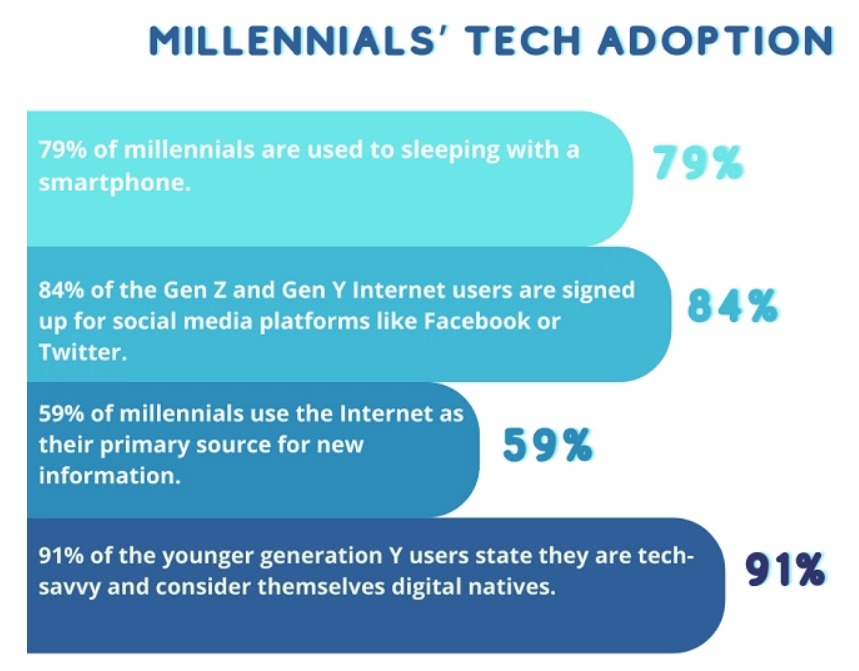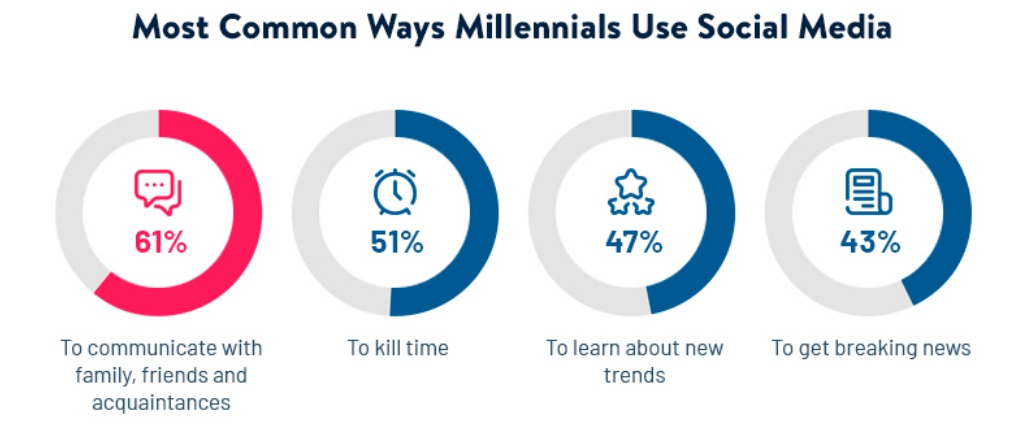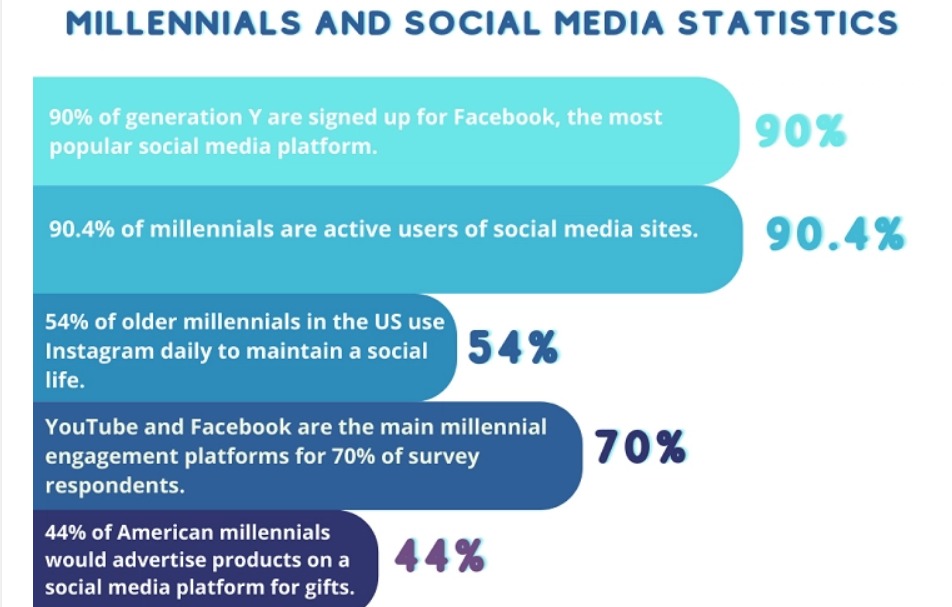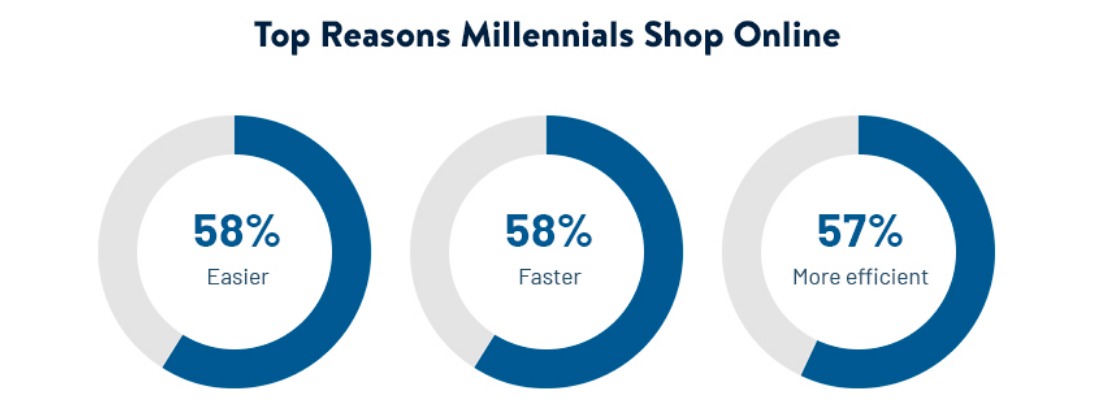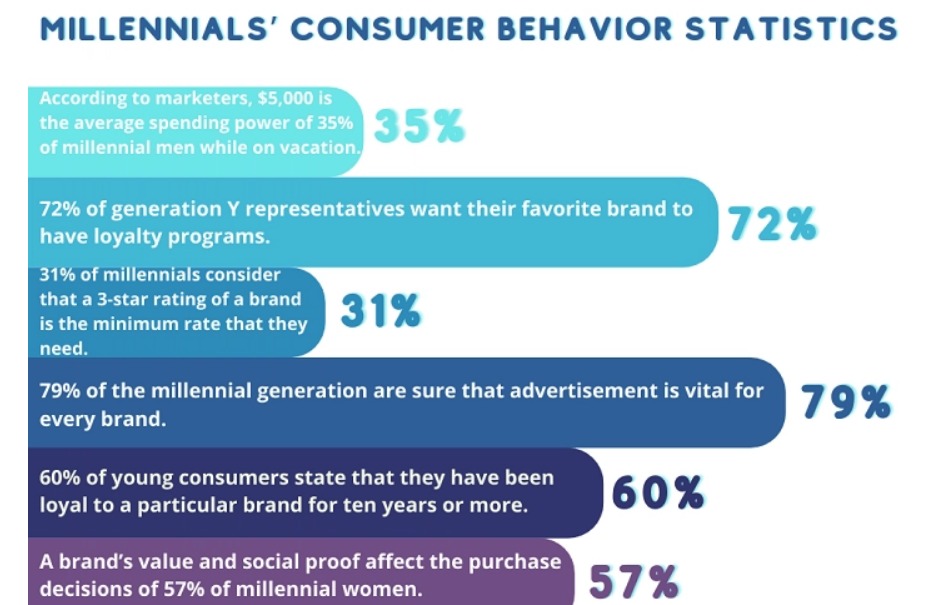lets Take A Deep Dive into Millennial Marketing Statistics, Insights, and Trends.
Millennials, often referred to as Gen Y members, comprise individuals born between 1981 and 1995. This generation, characterized by its significant size, has grown up in an era of rapid and constant change.
Understanding the behavior patterns of millennials can be gained through millennial marketing statistics.
I was surprised by some of these facts, and I bet you will be, too. So, whether you’re a business owner or just curious about the latest trends, let’s explore these cool insights together!
| Category | Key Statistics and Insights |
|---|---|
| Economic Impact | Millennials contributed $600 billion in the U.S. last year, $1.4 trillion global purchasing potential; 50% of the global workforce; 15% worked as teenagers; 15% live with parents. |
| Demographics | 77.12 million in the U.S.; 23.6% of the U.S. population; Median marriage age around 30; 83% prioritize wellness. |
| Technology Usage | 75% are internet users; 20% watch traditional TV and check phones 150 times daily; 84% are on social media; and 91% are tech-savvy. |
| Online Shopping and Preferences | 73% shop online via smartphones; One-third tried VR; Prefer iPhones; 33% use ad blockers; 75% like messaging; 25 hours online weekly. |
| Social Media Engagement | 90% are on Facebook, 54% are on Instagram daily, 70% are on YouTube and Facebook, and 44% are on gifts. |
| Influencer Marketing Response | 247% are more influenced by social media, 20% unfollow aggressive brands, 44% trust social media experts, and 40% are close to influencers. |
| Buying Behavior | 40% check social media reviews; Half find local businesses online; 87% make unplanned purchases; 60% are loyal with good experience; 57% compare prices. |
| Consumer Preferences | 38% of U.S. homebuyers spend $281 on average groceries; 39% use mobile payments; 38% prefer eco-friendly; 55% choose quality over price. |
Fascinating Millennial Marketing Statistics, Insights, and Trends for 2023:
The economic impact of millennials in the United States amounted to a remarkable $600 billion in the previous year.
On a global scale, millennials possess a staggering purchasing potential of $1.4 trillion.
This generation constitutes an impressive 50% of the entire worldwide workforce. Notably, one out of every four millennials was engaged in work during their teenage years.
Additionally, 15% of millennials currently choose to reside with their parents.
These statistics reflect the substantial economic influence wielded by millennials, both nationally and internationally.
Their significant purchasing power underscores their role as a pivotal target audience for businesses seeking growth and success.
The substantial representation within the workforce signifies millennials’ importance as employees and potential consumers.
Moreover, the data suggests that work ethics and early employment experiences are prevalent among this generation.
Furthermore, the fact that a considerable portion continues to live with their parents may indicate various factors, such as economic conditions, housing trends, or shifting cultural norms.
Understanding these statistics helps businesses tailor their marketing strategies to effectively engage with millennials and tap into their substantial market potential.
Millennials’ Demographics Insights:
- The United States is home to a significant millennial population of approximately 77.12 million individuals.
- Millennials account for about 23.6% of the entire U.S. population, highlighting their substantial representation within society.
- According to millennial demographics data, the median age for marriage among millennials is around 30 years old. This indicates a shift in marriage trends compared to previous generations.
- A striking trend in millennial priorities is evident, with 83% of this generation placing a strong emphasis on wellness and well-being.
Implications and Significance:
- The sizable presence of millennials in the U.S. underlines their role as a crucial consumer segment and workforce. Businesses must tailor their products and services to align with their preferences and needs.
- The delayed median age for marriage reflects changing societal norms and economic factors that impact major life decisions.
- The emphasis on wellness underscores the health-conscious nature of millennials. Companies can leverage this insight to develop products and services that cater to their desire for holistic well-being.
Millennials and Technology Insights:
- A significant 75% of millennials are connected to the Internet, showcasing their high digital connectivity and reliance on online resources.
- Within the millennial cohort, approximately 20% of younger individuals engage with traditional TV consumption, highlighting a shift in media preferences influenced by technological trends.
- On an average day, a millennial checks their smartphone an astonishing 150 times, underscoring their heavy reliance on mobile devices for various activities.
Implications and Significance:
- The widespread Internet access among millennials signifies their digital fluency, making online platforms an essential channel for businesses to engage with this generation.
- The decline in traditional TV viewership among younger millennials suggests a preference for digital content consumption. Brands should consider incorporating digital advertising strategies to effectively reach and resonate with this segment.
- The frequent smartphone-checking behavior underscores the role of mobile devices as an integral part of millennials’ lives. This presents opportunities for businesses to develop mobile-friendly content and apps to connect with this audience on a personal level.
Millennials and Technology Adoption:
Source: thrivemyway.com
- A substantial 79% of millennials have incorporated smartphones into their bedtime routines, highlighting the close relationship between this generation and their devices.
- Among Internet users in Generation Z and Generation Y (millennials), an impressive 84% are actively engaged on social media platforms like Facebook and Twitter, showcasing their strong online presence.
- Around 59% of millennials rely on the Internet as their primary avenue for accessing new information, illustrating the shift towards digital platforms for knowledge acquisition.
- An overwhelming 91% of younger Generation Y users view themselves as tech-savvy digital natives, emphasizing their comfort and familiarity with technology.
Implications and Insights:
- The prevalence of sleeping with smartphones underscores the integral role technology plays in millennials’ daily lives, necessitating brands to optimize mobile experiences and engagement strategies.
- The high participation of millennials on social media platforms emphasizes the importance of leveraging these channels for effective marketing and brand communication.
- The Internet’s central role in information consumption highlights the need for businesses to establish a strong online presence to cater to millennials’ preference for digital content.
- The self-perceived tech-savviness of younger Generation Y users indicates a receptiveness to innovative tech solutions, creating opportunities for businesses to introduce and promote cutting-edge products and services.
Millennials and Technology Engagement:
Source: 99firms.com
- A significant 73% of Generation Y customers employ their smartphones for online shopping, reflecting the growing influence of mobile commerce in millennials’ consumer behavior.
- Approximately one-third of millennials have embraced Virtual Reality (VR) experiences, showcasing their openness to innovative and immersive technologies.
- Millennial statistics reveal that the Apple iPhone stands out as the preferred device model within this demographic, indicating Apple’s strong appeal and influence.
- Apple emerges as the dominant tech brand among millennials, underscoring its brand resonance and popularity within this tech-savvy generation.
- An encouraging 73% of millennials acknowledge technology’s positive impact on their work-life balance, emphasizing its role in enhancing their overall quality of life.
Implications and Insights:
- The prevalence of smartphone usage for online shopping underscores the need for businesses to optimize their mobile e-commerce platforms to cater to millennials’ shopping preferences.
- The adoption of Virtual Reality signifies millennials’ readiness to explore novel technological experiences, suggesting opportunities for businesses to incorporate VR into their marketing strategies.
- Apple’s stronghold in device preference and brand loyalty indicates the importance of aligning products and services with millennials’ tech preferences to foster brand engagement.
- Apple’s prominence as the preferred tech brand underscores the significance of building a strong brand identity and cultivating brand trust to resonate with millennial consumers.
- The positive correlation between technology and work-life balance indicates millennials’ openness to tech solutions that enhance their well-being, offering companies a chance to develop tools that cater to this aspect.
Millennials’ Online Behavior:
- About one-third (33%) of millennials employ ad-blocking software to shield themselves from online brand advertisements, reflecting a degree of resistance to traditional advertising methods.
- A significant three out of four millennials opt for messaging as their preferred mode of social communication, aligning with the communication preferences of Generation X.
- Millennial statistics indicate that this demographic dedicates an average of 25 hours to online activities for personal purposes, showcasing their substantial digital engagement.
Implications and Insights:
- The adoption of ad-blocking software by a considerable portion of millennials underscores the challenge of reaching this generation through traditional online advertising, pushing brands to explore alternative, less intrusive marketing strategies.
- The preference for messaging highlights the importance of leveraging messaging apps and platforms as effective communication channels for brands aiming to connect with millennials on their preferred platforms.
- The significant time spent online underscores the digital-centric nature of millennials’ lives, emphasizing the need for businesses to establish a strong online presence to capture and maintain their attention.
Millennials’ Social Media Engagement:
Source: thrivemyway.com
- A substantial 90% of Generation Y individuals are registered users of Facebook, indicating the platform’s pervasive popularity among this demographic.
- Notably, 90.4% of millennials are actively engaged on social media platforms, highlighting their significant presence and interaction within these online communities.
- Around 54% of older millennials in the US utilize Instagram on a daily basis to foster and nurture their social connections, showcasing the platform’s role in maintaining social relationships.
- YouTube and Facebook stand out as the primary engagement hubs for 70% of survey participants, underlining these platforms’ central role in millennials’ online interactions.
- Demonstrating their inclination towards leveraging their online presence, 44% of American millennials express their willingness to promote products on social media platforms in exchange for gifts.
Implications and Insights:
- The widespread Facebook usage signifies its continued relevance as a social media staple, encouraging brands to incorporate the platform into their marketing strategies to engage with millennials.
- The high level of active social media engagement suggests that brands targeting millennials must have a strong and consistent social media presence to effectively connect and communicate with this audience.
- The daily use of Instagram among older millennials points to the platform’s potential as a tool for brands to connect with this age group and cater to their social interaction needs.
- The prominence of YouTube and Facebook as engagement platforms suggests that video and versatile content remain crucial for captivating millennials’ attention.
- The willingness to endorse products for gifts reveals millennials’ interest in participatory online experiences, providing brands with opportunities for creative influencer partnerships and user-generated content campaigns.
Quick links:
- The Millionaire Guide to Affiliate Marketing Success ft. Katrina Hier
- Best AI Marketing Tools To Grow Your Business
- Data-Driven Marketing; Maximizing Marketing ROI
Millennials’ Response to Influencer Marketing:
- Compared to an average baby boomer, a millennial shows a remarkable 247% higher likelihood of being influenced by content on social media platforms. This underscores the significant impact that digital channels have on shaping millennials’ consumer choices.
- A noteworthy one in five millennials will promptly unfollow a brand if its marketing approach comes across as aggressive or bothersome. This highlights the importance of authenticity and respectful engagement in retaining millennial audiences.
- A substantial 44% of millennials place their trust in social media experts, even if they are strangers, indicating the pivotal role of influencer marketing. This insight underscores the effectiveness of leveraging trustworthy influencers to sway millennial purchasing decisions.
- In contrast to older generations, an impressive 40% of Gen Z and Gen Y subscribers express that an influencer holds a closer connection to them than an in-person friend. This dynamic suggests the strong emotional bond that influencers can establish with younger audiences.
Implications and Insights:
- The heightened susceptibility to social media influence among millennials signifies the power of targeted influencer collaborations in driving brand awareness and sales within this demographic.
- The swift unfollowing behavior underscores the significance of respectful and non-intrusive marketing tactics, emphasizing the need for brands to adopt a customer-centric approach in their influencer partnerships.
- The trust placed in unfamiliar social media experts points to the credibility and sway influencers hold over millennials, prompting brands to strategically choose influencers who align with their values and resonate with their target audience.
The closeness felt towards influencers highlights the evolving nature of digital relationships, inspiring brands to curate influencer content that feels genuine and relatable and fosters a sense of community among millennial consumers.
Millennials’ Buying Behavior Insights:
Source: 99firms.com
- A substantial 40% of millennials exhibit a propensity to scrutinize brand reviews on social media prior to finalizing a purchase. This indicates the weight of peer feedback and digital reputation in shaping their buying decisions.
- Half of millennial consumers utilize the Internet to scout for local businesses, underscoring the significance of online presence for brick-and-mortar establishments in capturing millennial attention.
- An impressive 87% of Generation Y demonstrates a tendency to engage in unplanned purchases, reflecting their impulsive shopping behaviors influenced by digital marketing strategies and personalized offers.
- Notably, 60% of millennials exhibit a potential for developing brand loyalty when they encounter a gratifying customer experience. This highlights the pivotal role of customer satisfaction in fostering long-term connections with this generation.
- A substantial 57% of buyers showcase the inclination to compare brand prices across different retail outlets prior to committing to a purchase. This mirrors millennials’ conscientious approach to spending and their resourceful navigation of the digital marketplace.
Implications and Significance:
- The inclination to research brand reviews signifies the vital role of authentic user-generated content and positive online interactions in gaining millennials’ trust and steering their purchasing choices.
- The emphasis on online local business searches indicates the need for establishments to establish a robust digital presence, making vital information easily accessible to millennial consumers seeking local solutions.
- The high percentage of unplanned purchases suggests the potential effectiveness of targeted and persuasive online promotions in influencing millennials to make spontaneous buying decisions.
- The link between brand loyalty and satisfying experiences emphasizes the importance of brands prioritizing exceptional customer service and engagement to win over millennials’ lasting devotion.
- The price comparison behavior underscores the value millennials place on obtaining the best value for their money, prompting brands to maintain competitive pricing strategies to resonate with this price-conscious generation.
Millennials’ Consumer Preferences Insights:
Source: thrivemyway.com
- An impressive 38% of homebuyers in the US belong to the millennial generation, illustrating their significant presence and influence in the real estate market. This showcases their growing economic clout and aspiration for homeownership.
- According to millennial spending statistics, the average monthly expenditure on groceries stands at $281. This highlights millennials’ allocation of their budgets towards sustenance and their potential impact on the food industry.
- Notably, 39% of Generation Y customers opt for mobile payments when conducting online purchases, reflecting their tech-savvy nature and inclination toward seamless and convenient transaction methods.
- Markedly, 38% of millennials exhibit a preference for environmentally friendly products, indicating their heightened consciousness of sustainability and their potential to drive demand for eco-conscious offerings.
- An impressive 55% of Generation Y buyers prioritize quality over affordability, underlining their discerning nature and emphasis on obtaining products that align with their standards of excellence.
Implications and Significance:
- The substantial millennial presence in the homebuyer demographic underscores the need for real estate professionals to tailor their offerings to meet the preferences and aspirations of this generation, potentially influencing housing market trends.
- The average monthly grocery spending figure indicates millennials’ capacity to shape the food industry, prompting brands to consider their preferences and values when designing products and marketing strategies.
- The prevalence of mobile payment usage signifies the importance of providing user-friendly and secure mobile transaction options to cater to millennials’ preferences for seamless online shopping experiences.
- The preference for environmentally friendly products reflects millennials’ commitment to sustainability, prompting brands to develop and promote eco-friendly options that resonate with their values and drive sales.
- The prioritization of quality over affordability highlights millennials’ discerning nature and the significance of offering products that meet their standards of excellence and deliver lasting value.
FAQs
🤔 What is the purchasing power of millennials in 2024?
Millennials have a significant purchasing power, estimated to be around $1.4 trillion globally.
📱 How often do millennials use their smartphones for shopping?
A large majority of millennials, about 73%, use their smartphones for online shopping.
🌐 What percentage of millennials are active on social media?
Approximately 84% of millennials are active on various social media platforms.
💼 What role do millennials play in the global workforce?
Millennials make up about 50% of the global workforce, playing a crucial role in the economy.
📉 Are millennials inclined towards traditional TV or online content?
Only 20% of millennials engage with traditional TV, showing a strong preference for online and digital content.
🤝 How loyal are millennials to brands?
Around 60% of millennials develop brand loyalty based on good customer experiences.
You may also read:
- Best Instagram Reel Statistics
- Best Word-of-Mouth Marketing Statistics
- Top Email Marketing Statistics To Consider
- Staggering Video Marketing Statistics
Conclusion: Millennial Marketing Statistics
Alright, I’ve had a great time exploring all these Millennial Marketing Statistics. It’s been eye-opening to see what really clicks with the 20s and 30s crowd.
Remember, these stats aren’t just numbers – they’re like a map that shows me how to connect better with millennials.
Whether I’m selling products, creating ads, or just trying to stay up-to-date, these insights are super helpful.
Thanks for joining me on this journey. I hope you found it as interesting as I did and that it helps you in your own ventures. Keep these stats in mind, and you’ll be on the right track!


